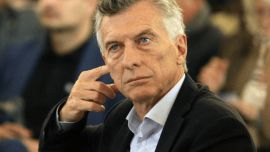Chile's former president Sebastián Piñera, a billionaire tycoon who twice held the nation's top job, died Tuesday in a helicopter crash, his office has confirmed in a statement.
The 74-year-old often flew himself around in his own helicopter, and was a former shareholder in the country's national airline, with stakes in television and football, among other businesses.
The crash took place in Lago Ranco, a lake district some 920 kilometres (570 miles) south of Santiago, where Piñera spent vacations with his children and grandchildren.
"It is with deep regret that we announce the death of the former president of the Republic of Chile," his office said in a statement.
Three other people who had been in the helicopter survived the crash, reportedly said to be an ex-government official and relatives of the deceased leader.
Former and current Latin American leaders offered their tributes, including Peruvian President Dina Boluarte and former Bolivian presidents Evo Morales and Jeanine Áñez.
Argentina's President Javier Milei sent condolences on behalf of his nation.
"The President's office regrets the tragic death of Sebastián Piñera," the press release read. "On behalf of the entire Argentine State, we send our condolences to your family, friends and all of the Chilean people."
Colombia's Foreign Ministry also sent its "sincere condolences" to the Chilean people in a statement remembering the Piñera government's support in Bogotá's peace negotiations with the FARC guerrilla group.
Brazil's President Luiz Inácio Lula da Silva wrote on X that he was "surprised and saddened" by Piñera's death.
"We got along, we worked to strengthen the relationship between our countries and we always had a good dialogue, when we were both presidents, and also when we weren't."
Piñera served two non-consecutive terms in office, between 2010 and 2014 and again from 2018 to 2022.
Troubled second term
In 2010, the Harvard-educated economist convinced the electorate that his personal success in business could be transferred to the benefit of society.
He managed to bring back to power a revamped right-wing that had rid itself of the baggage of being associated with Augusto Pinochet's 1973-1990 dictatorship.
"He will have all the honors and recognition that he deserves," said Interior Minister Carolina Toha, of the leftist government of President Gabriel Boric, who succeeded Piñera in 2022.
During his first mandate, he led the country's reconstruction efforts after a powerful earthquake and tsunami in 2010, and oversaw the successful rescue of 33 miners trapped in the Atacama Desert.
His second term, however, was fraught with trouble, as rising discontent over Chile's deep-rooted social inequality exploded into protests that started after a rise in metro fares.
A rich businessman seen as the embodiment of the country's injustices, Piñera's martial tone and early decision to deploy the military proved disastrous and failed to quell the growing demonstrations, accompanied by violence and looting.
Protesters demanded a change to an economic model in which healthcare, education and pensions were privately run and there was a massive gulf between rich and poor.
The unprecedented protests convinced parliament to agree to hold a referendum on changing the country's dictatorship-era constitution.
Piñera, who failed to either propose or support the move, again appeared out of touch with the people he governed.
Despite overwhelming support for a new constitution, voters have since twice rejected proposed drafts and Boric has said he is done trying to reform it.
Piñera's woes only increased with the arrival of the Covid-19 pandemic and the country's worst economic crisis in decades.
He was later implicated in the so-called 'Pandora Papers,' suspected of a conflict of interests over the sale of a mine by members of his family to a close friend, and completed in a tax haven.
While Chile's Senate blocked opposition attempts to impeach Pinera, he became the subject of a graft investigation.
Pinera ended his second term in office with low approval ratings.
At the time of his death, Forbes magazine estimated his net worth at US$2.4 billion.
Piñera was married with four children and nine grandchildren.
– TIMES/AFP
























Comments